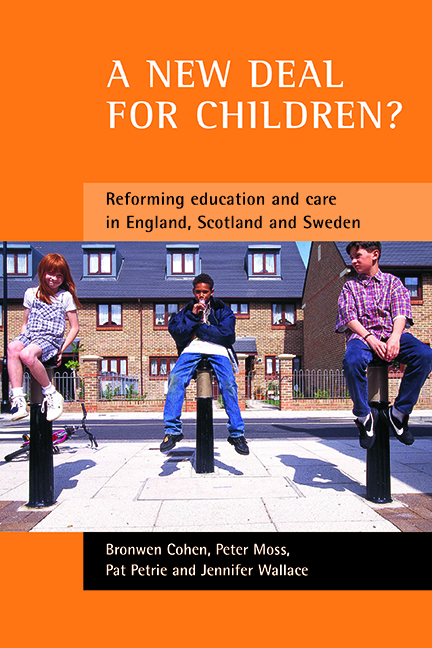Book contents
- Frontmatter
- Contents
- Acknowledgements
- List of abbreviations
- Glossary of terms
- Part One International comparisons of social and educational reforms: background and contexts
- Part Two Bringing childcare services into education
- Part Three A comparative overview and future directions
- References
- Appendix Fieldwork
- Index
- Also available from The Policy Press
one - Introduction
Published online by Cambridge University Press: 20 January 2022
- Frontmatter
- Contents
- Acknowledgements
- List of abbreviations
- Glossary of terms
- Part One International comparisons of social and educational reforms: background and contexts
- Part Two Bringing childcare services into education
- Part Three A comparative overview and future directions
- References
- Appendix Fieldwork
- Index
- Also available from The Policy Press
Summary
A new deal for children? is about how the national governments in three countries – England, Scotland and Sweden – have changed the relationship between three types of children’s services: early childhood education and care (services that go under names such as pre-schools, kindergartens, nurseries and nursery classes, all for children below compulsory school age); schools (for children of compulsory school age and beyond); and school-age childcare (services that, among other functions, provide for the children of working parents before school starts in the morning, at the end of the school day and during holidays). At around the same time, in the mid- to late 1990s, each country brought responsibility for all of these services together in the same government department: education. This book arises from the authors’ research into these reorganisations and other related reforms. The reforms that we have studied raise important practical, political and theoretical issues: about the meaning of and relationship between children’s education and care; about the relationship between these areas, family life and employment; about the work of those engaged face to face with children; and, not least, about how these changes affect, and are affected by, children’s relationship to society and society’s understanding of childhood.
We need to recognise that the three countries in our study do not have the same national status. England and Scotland form part of one state, the United Kingdom (UK), while Sweden is a unitary nation state. England and Scotland, however, are distinct countries and may justifiably be treated separately from each other. Even after the Treaty of Union in 1707, which ended the separate Scottish Parliament, Scotland had its own legislation and distinct legal and educational systems. With devolution in 1999, Scotland has regained its parliament, is governed by a Scottish Executive, and has legislative, executive and financial responsibility for the services discussed in this book. Although Scotland is much more similar to England than to Sweden in most respects, there are nevertheless important and growing differences between the two countries, and since devolution Scotland has enjoyed substantial freedom to develop its own policy, provision and practice. The main limitations on this independence are the responsibility that continues to rest with the UK government in a number of relevant areas and the growing influence of HM Treasury on many aspects of policy. We discuss these issues in later chapters.
- Type
- Chapter
- Information
- A New Deal for Children?Reforming Education and Care in England, Scotland and Sweden, pp. 3 - 16Publisher: Bristol University PressPrint publication year: 2004



